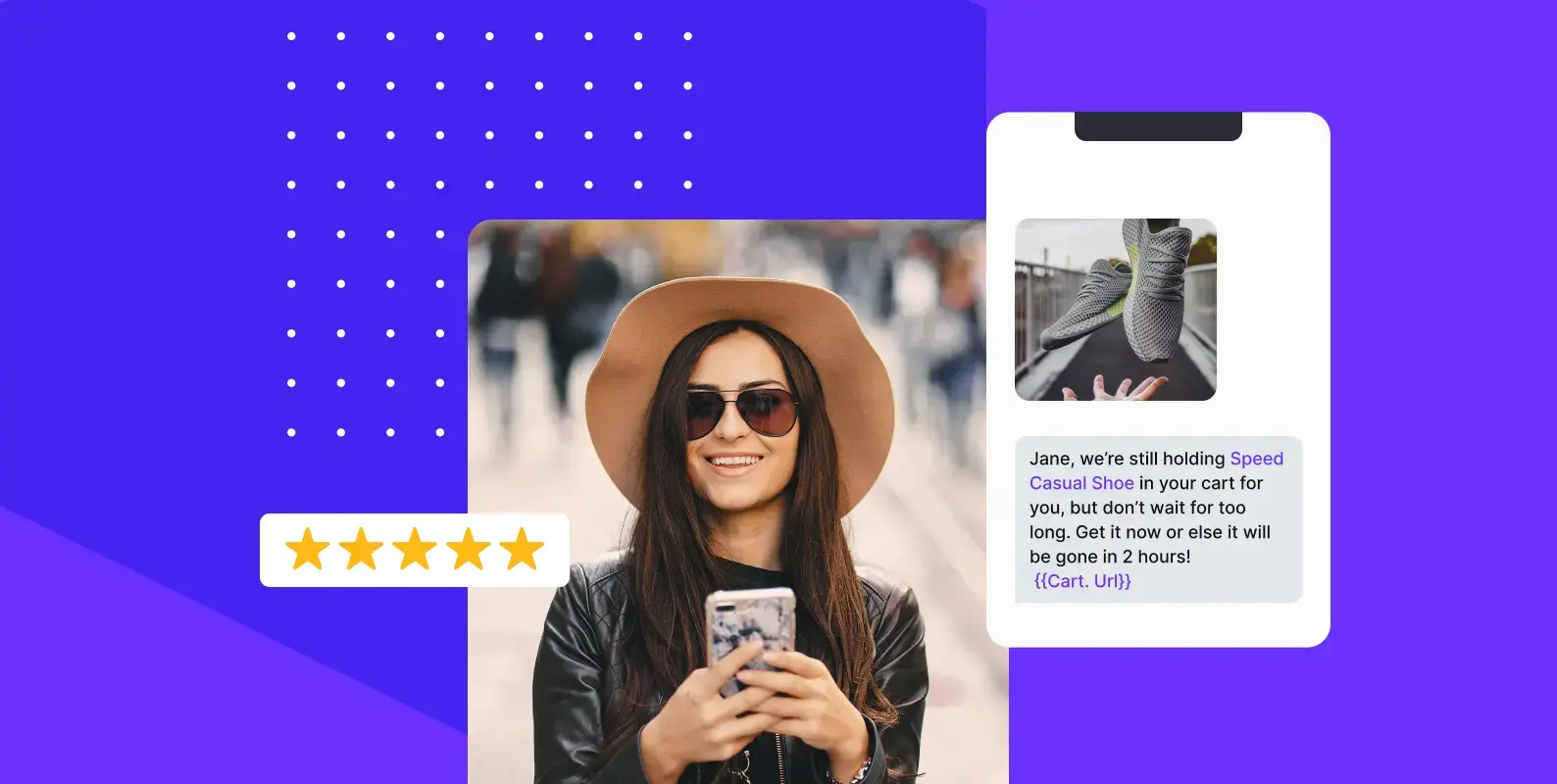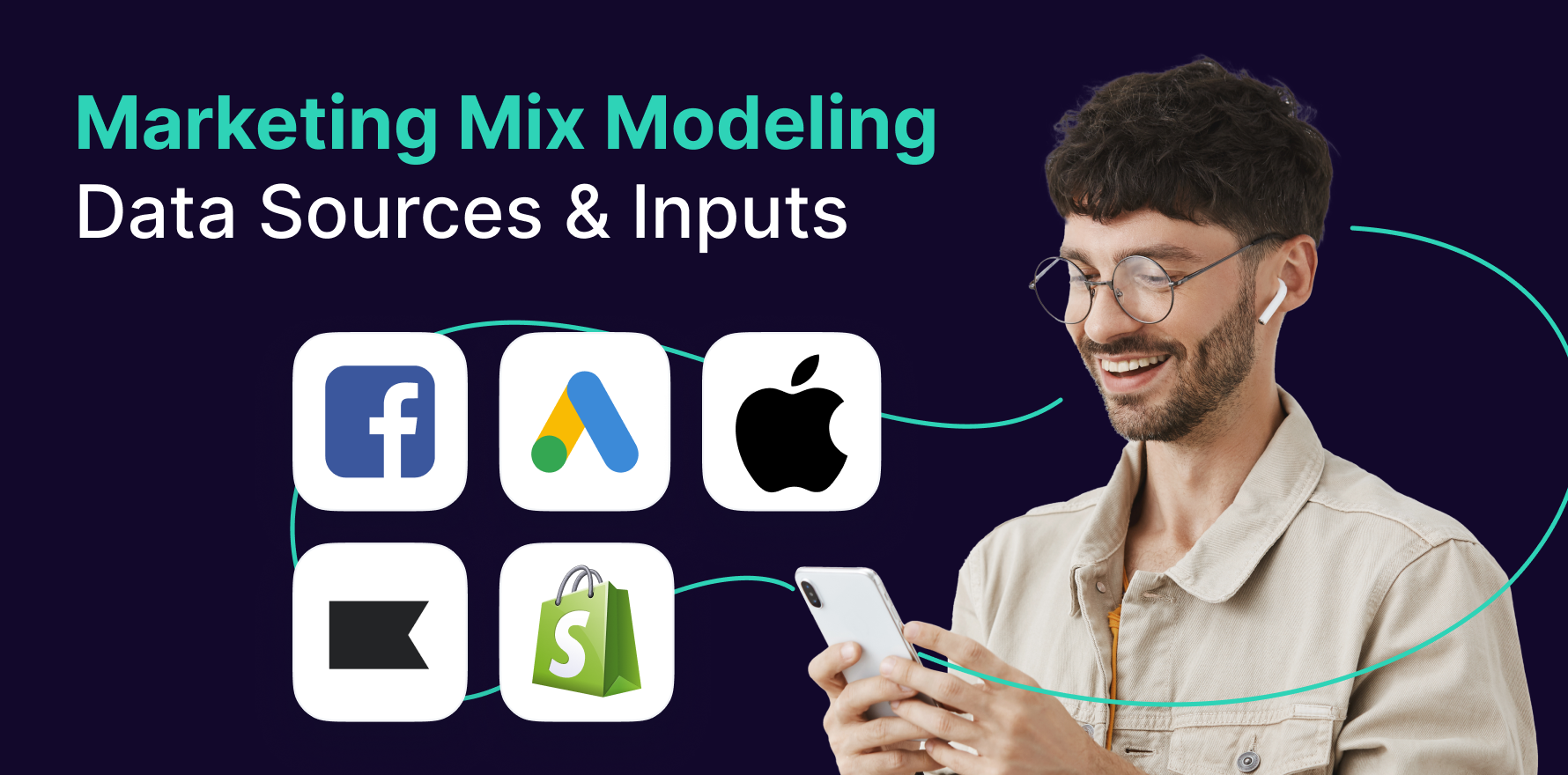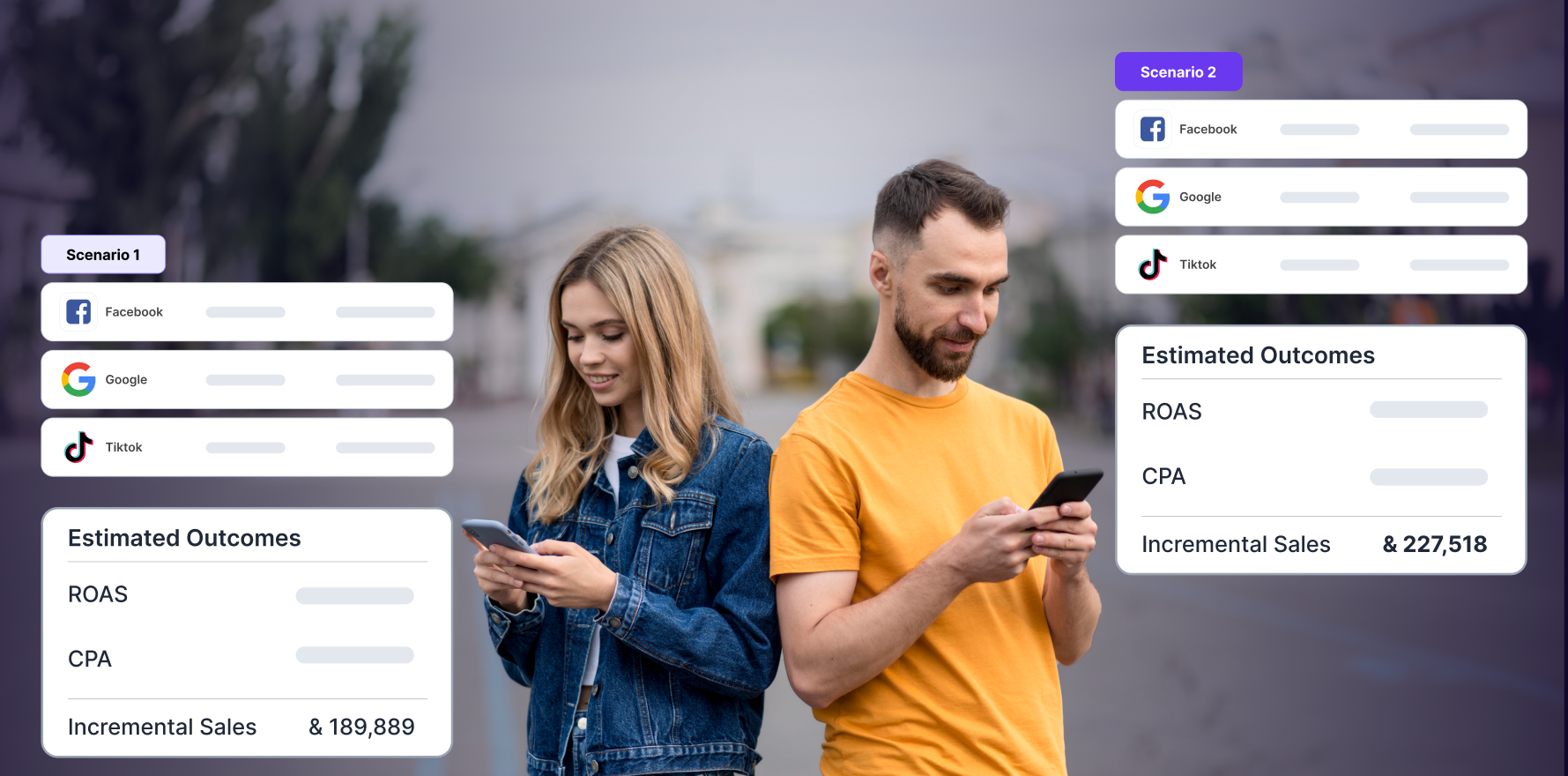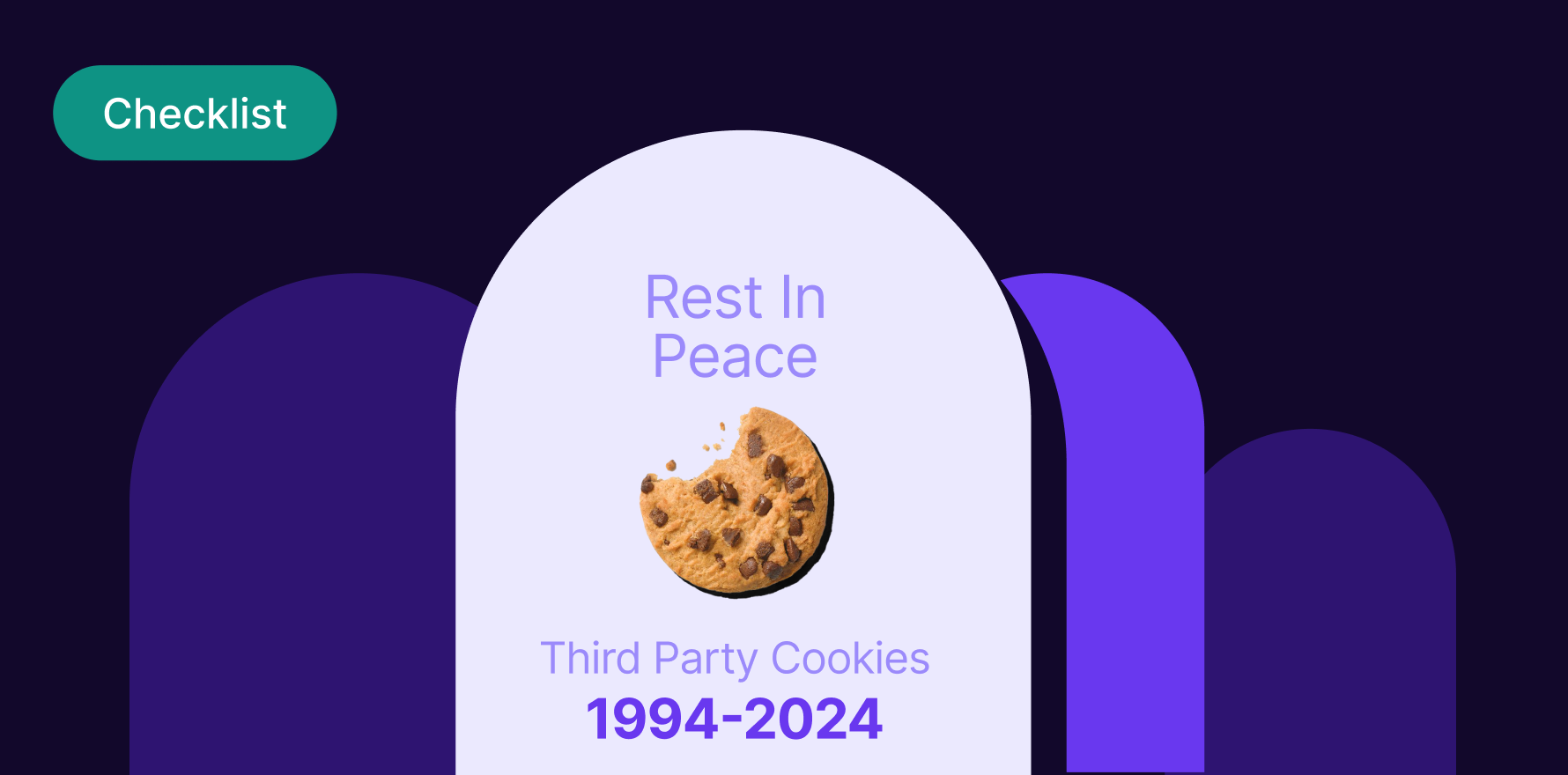In today’s ever-evolving digital landscape, ecommerce and DTC businesses have emerged as disruptors, transforming the traditional retail industry. These brands have found innovative ways to capture the attention of customers and deliver tailored experiences. One such powerful tool is WhatsApp marketing.
Equipped with interactive features and over 2 billion active monthly users worldwide, WhatsApp offers a unique channel for businesses to connect with their audience on a more personal level.
This guide explores the potential of WhatsApp marketing strategy for Ecommerce and DTC businesses, with actionable ways to redesign the customer experience, foster connections, and unlock new avenues for growth.
WhatsApp Marketing Benefits for DTC Brands
By leveraging the platform’s wide user adoption and powerful features, brands can enhance their Ecommerce marketing strategies and achieve various business objectives. Here are some key benefits of marketing on WhatsApp for DTC brands:
- Lead Generation and Acquisition: With a global presence in 120 countries, a diverse user base, and availability in 60 languages, WhatsApp is an effective tool for generating leads and expanding into new markets.
- Automation for Personalization at Scale: WhatsApp marketing enables DTC brands to automate their messaging campaigns, allowing personalized interactions with a large number of customers. Through automation tools and chatbots, brands can deliver tailored content, recommendations, and offers based on customer preferences and behaviors, enhancing engagement and driving conversions.
- Simple and Intuitive User Experience: WhatsApp’s user-friendly interface ensures brands can communicate easily with their target audience. Its simplicity and familiarity contribute to a frictionless user experience, facilitating efficient customer engagement and reducing barriers to entry for potential customers.
- Upsell and Cross-Sell Opportunities: With WhatsApp marketing, DTC brands can implement upselling and cross-selling strategies to maximize sales opportunities. By providing relevant product recommendations and offers through targeted messaging, brands can encourage customers to make additional purchases and increase their average order value (AOV).
- Quick Customer Support: WhatsApp’s real-time messaging capabilities enable DTC brands to offer prompt customer support. Brands can address customer queries, resolve issues, and provide assistance with a short response time, fostering customer satisfaction and loyalty.
- Enhanced Post-Purchase Customer Experience: Once a customer places their order, brands can use WhatsApp to send order confirmations, shipment updates, tracking information, delivery notifications, post-purchase follow-ups, and request feedback. This establishes a direct communication channel and makes way for a smooth and transparent customer experience.
- Streamlined Notifications and Alerts: WhatsApp has an average open rate of 98%, so it makes sense to use the platform for communicating with customers. Businesses can keep customers in the loop about important updates, promotions, and events by sending relevant WhatsApp notifications.
Marketing on WhatsApp: Understanding WhatsApp Business API
As a DTC brand, tapping into the potential of WhatsApp’s Business API could be a game-changer for your customer interactions. Connect it with your preferred growth marketing platform, and unlock a world of opportunities to engage with your customers in a channel they already use and love.
Setting Up Your WhatsApp Business Account
Setting up a WhatsApp Business Account is the first step towards leveraging the platform for your DTC brand. We’ll guide you through this process step by step.
Creating a WhatsApp Business Profile
1) Install the WhatsApp Business app from the App Store or Google Play Store on your device.
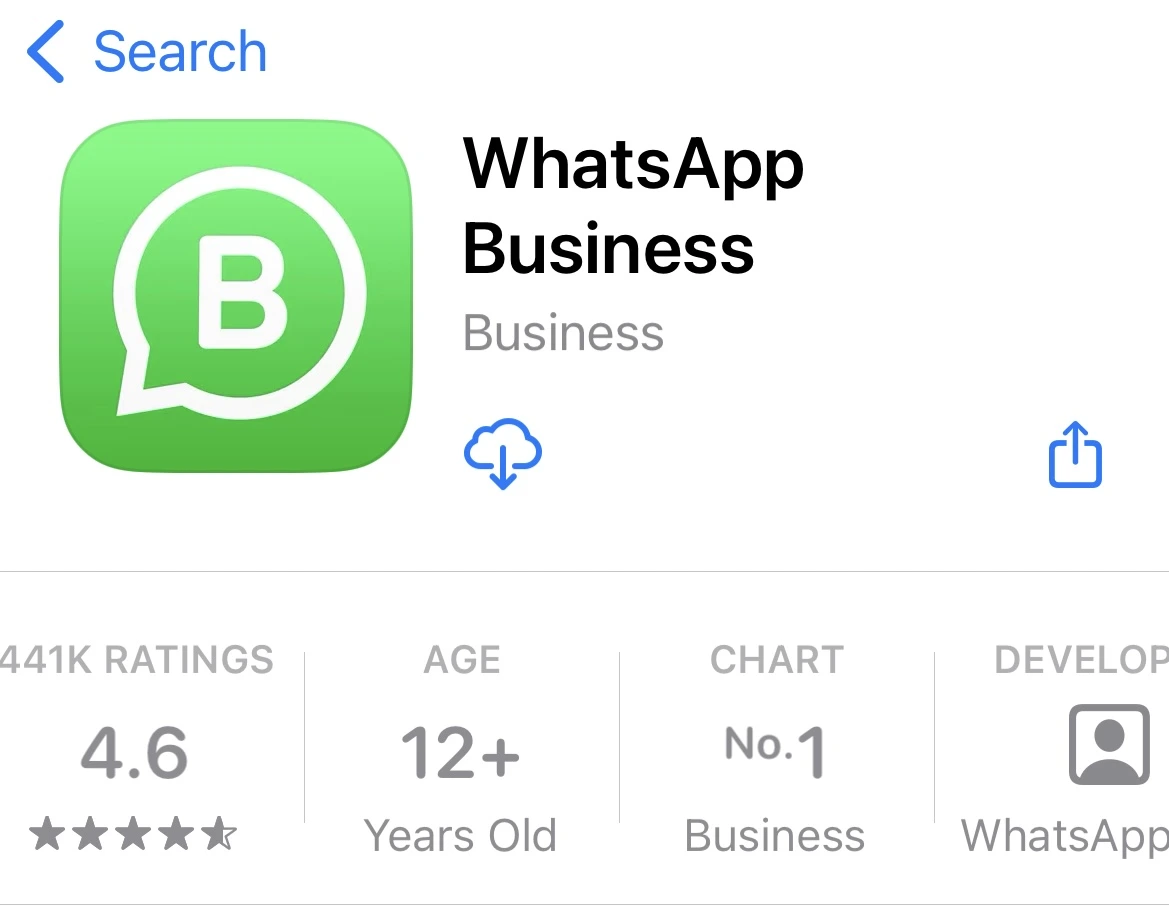
2) Open the app, go through the terms and conditions, and click on the ‘Agree & Continue’ button.
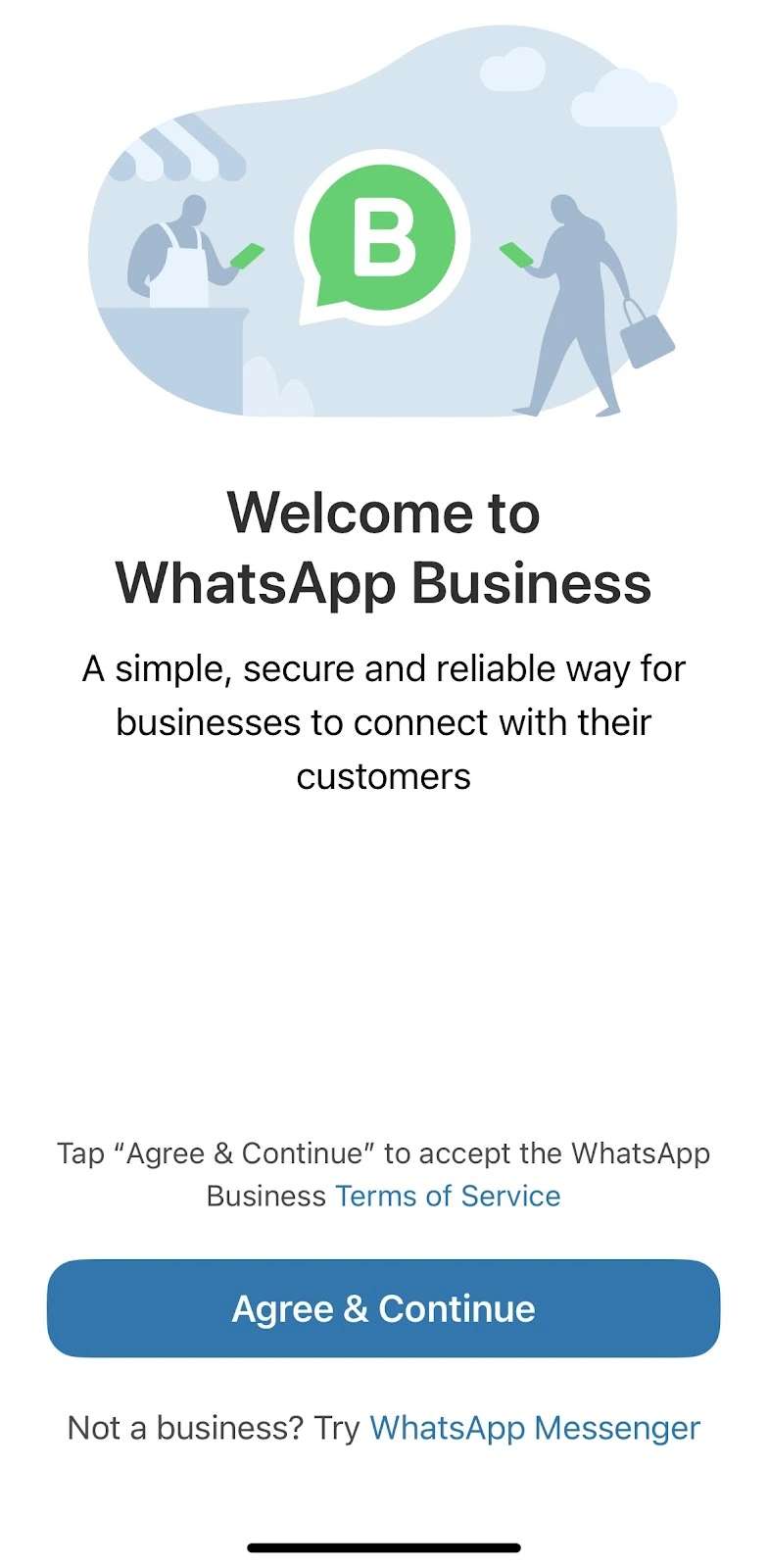
3) Select an existing or new phone number for your WhatsApp Business account.
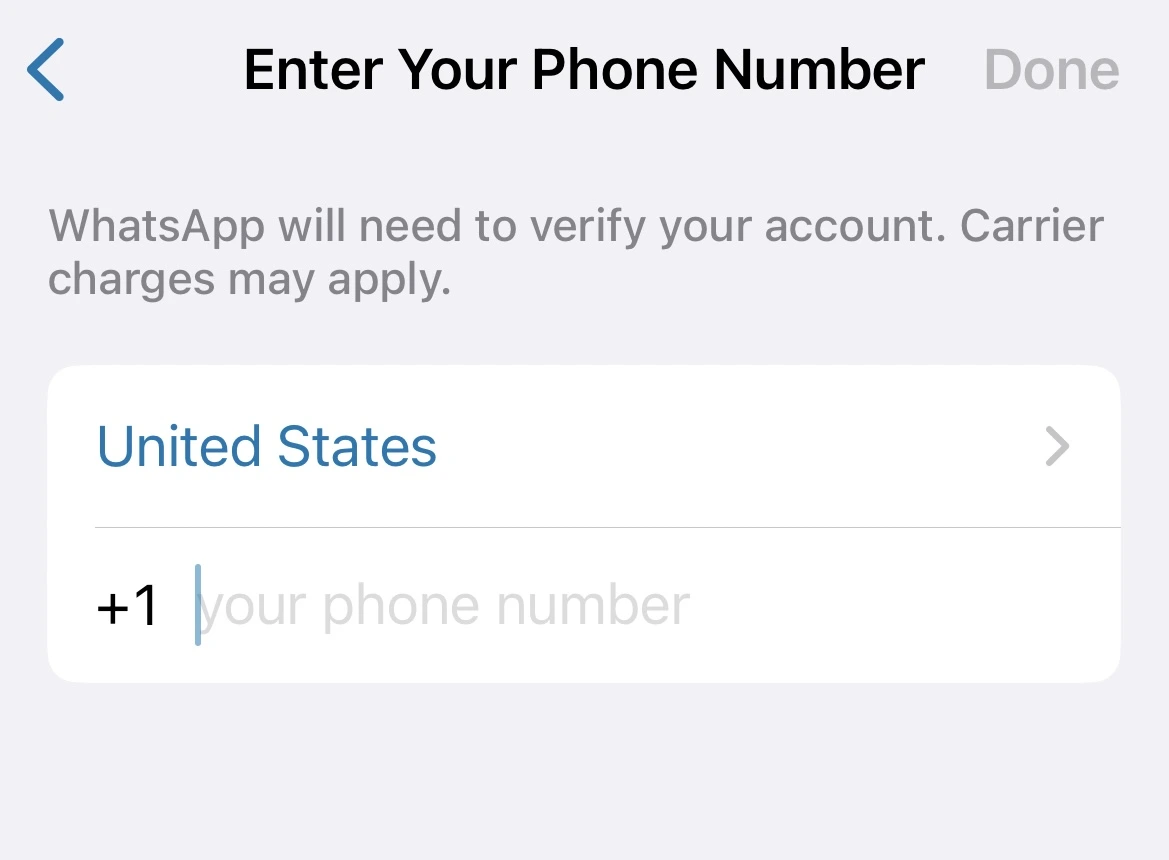
4) Enter your number, click on ‘Done’, and then tap ‘OK’ to receive your 6-digit code via call or SMS.
5) To create an account, add your business name, business category, and profile picture (could be the logo or any image that represents your brand).
6) Now go to Explore > Business Profile. Add your business address, a short description of your brand, address, hours, etc.
Verifying Your Business Account
Having a verified profile with the green badge provided by WhatsApp adds authority, credibility, and trustworthiness to your brand. When customers receive a communication from a verified account, they can be sure that the number belongs to an Official Business Account (OBA).
For verification, you’ll need a WhatsApp Business API account registered with a Facebook Business Manager account. You can submit your application via a third-party service provider or by yourself.
Here are the steps to apply for a green tick on WhatsApp:
1) Open Facebook Business Manager > Business Settings > WhatsApp Accounts.
2) Choose the WhatsApp account you want to verify.
3) Click on Settings > Ask a question > WABiz: Request official business account status.
4) Submit the required documents and information. Enable two-factor authentication on your account.
Meta takes the ultimate decision on whether your business account is eligible to get a green tick. Here are some tips to boost your chances of getting verified:
- Create an official website and email address for your brand
- Run click-to-WhatsApp marketing campaigns
- Maintain a high quality rating for your WhatsApp number
- Increase your brand’s visibility through media coverage.
You will receive a response from Meta within 7-10 days of submitting your application. And that’s it! Now you’re ready to scale your DTC business with WhatsApp marketing.
How to Use WhatsApp for Marketing: Successful WhatsApp Marketing Strategies & Examples
To successfully use WhatsApp for marketing, a well-thought-out strategy is essential. Lets look at successful WhatsApp marketing ideas and examples to set your DTC brand apart from the competition.
1) Personalize Your Communication
In 2023, the average number of emails sent and received per day is projected to be 347.3 million. What does this mean for your business? Your promotional mail might get lost in the sea of emails your customer receives every day.
In a world overwhelmed by generic promotions, personalizing your message can give your brand a competitive edge over the others.
WhatsApp marketing allows you to utilize your existing customer data to engage with shoppers on their special days and seasonal festivals. Curate a direct, personalized promotional message with a clear CTA.
WhatsApp marketing example: CaratLane, a gold and diamond jeweler, customizes communication by giving a discount on the customer’s birthday.
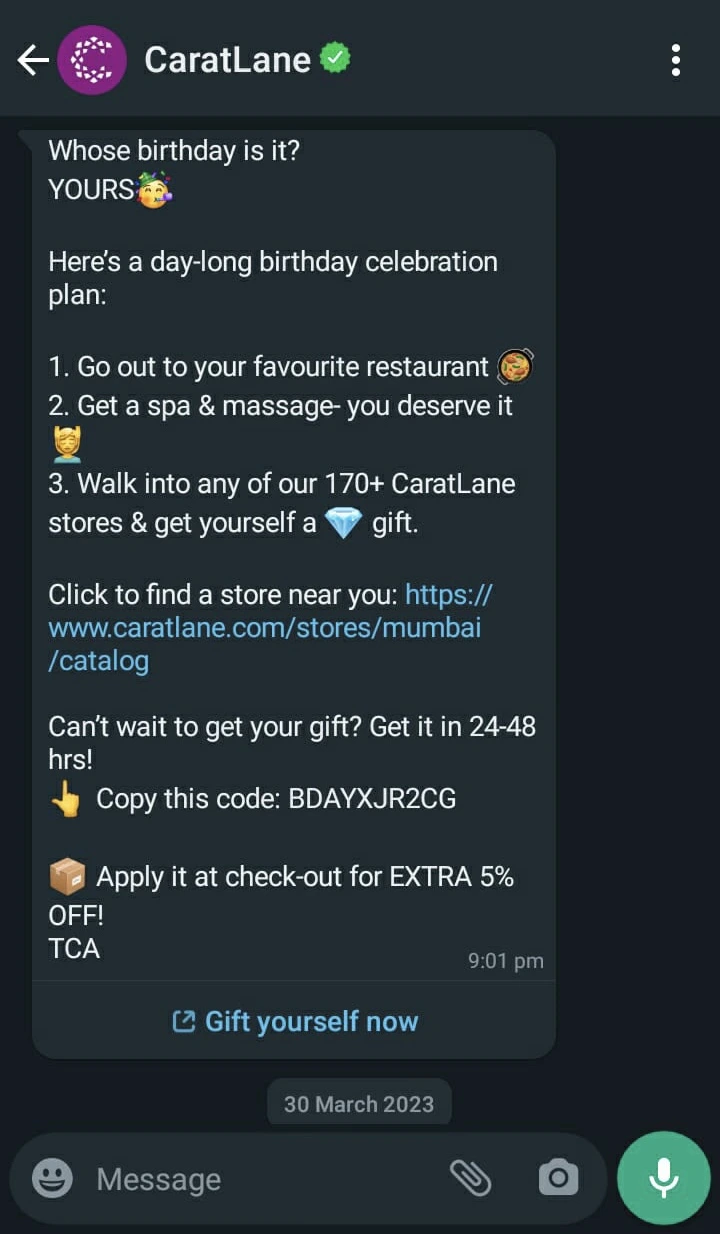
2) Utilize WhatsApp Status for Brand Storytelling and Sales
WhatsApp Status, with its 24-hour visibility, offers a unique platform for brand storytelling and driving sales.
Use it to share sneak peeks of an upcoming launch, behind-the-scenes moments, the stories behind your products, and any other content that helps build a connection with your customers.
WhatsApp marketing idea: If your ecommerce store is offering a limited-period discount, you can advertise it by posting a special coupon on your WhatsApp status. Mention that the offer is available only for the next 24 hours to create a sense of urgency and grab the attention of customers.
3) Make Use of Automated Responses
In today’s scenario, buyer patience is low – 90% of customers consider an “immediate” response as an important part of your customer service.
When a customer reaches out via WhatsApp, you can solve their queries with preloaded automated responses. It cuts down response time, makes sure you don’t miss out on any query or feedback, and leads to greater customer satisfaction.
Automated messages are a great way to welcome new customers, handle frequently asked questions, share order tracking details, and send reminders for upcoming events. But these automated responses may not have all the answers, so it’s always a good idea to offer customers the option to manually type a concern that is not listed down.
WhatsApp marketing example: Neeman’s, the DTC footwear brand uses automation to reply instantly, that too in a tone that makes customers feel like they are interacting with a human customer service agent.
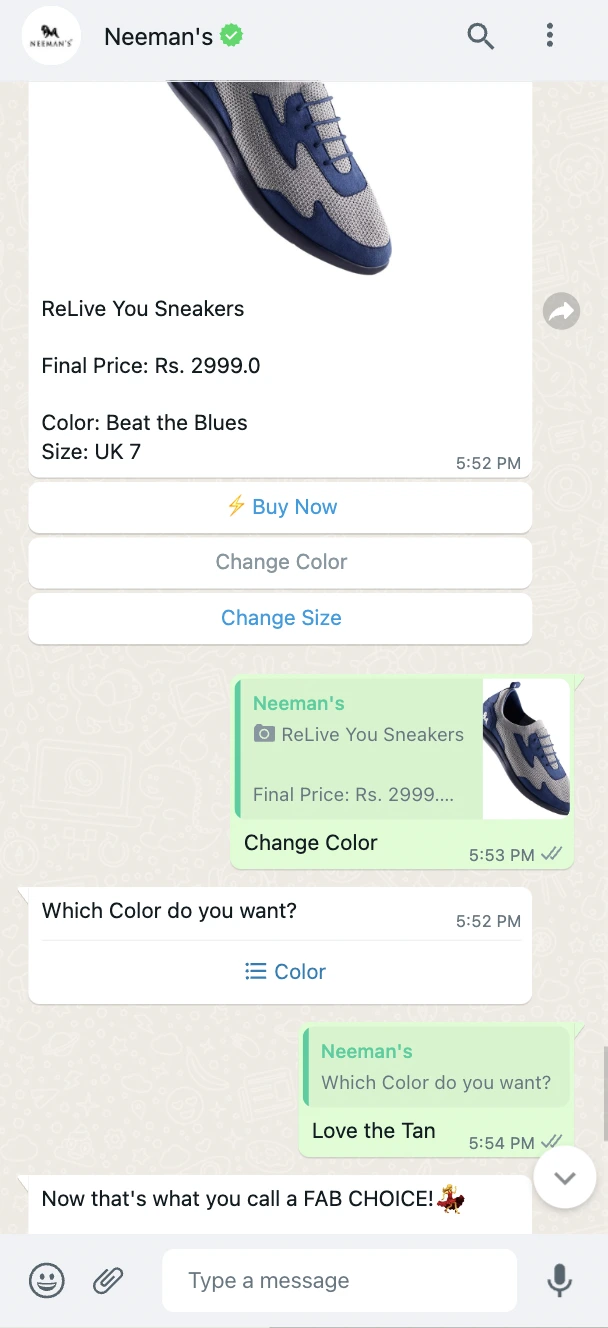
4) Integrate WhatsApp with CDP
Integrating WhatsApp with a customer data platform (CDP) like Lifesight helps attract, engage, support, and retain your customers and drive revenue. Lifesight, with the help of automation and AI, collects leads and customer data on your behalf from emails, SMS channels, and 100+ touchpoints and groups them into RFM segments.
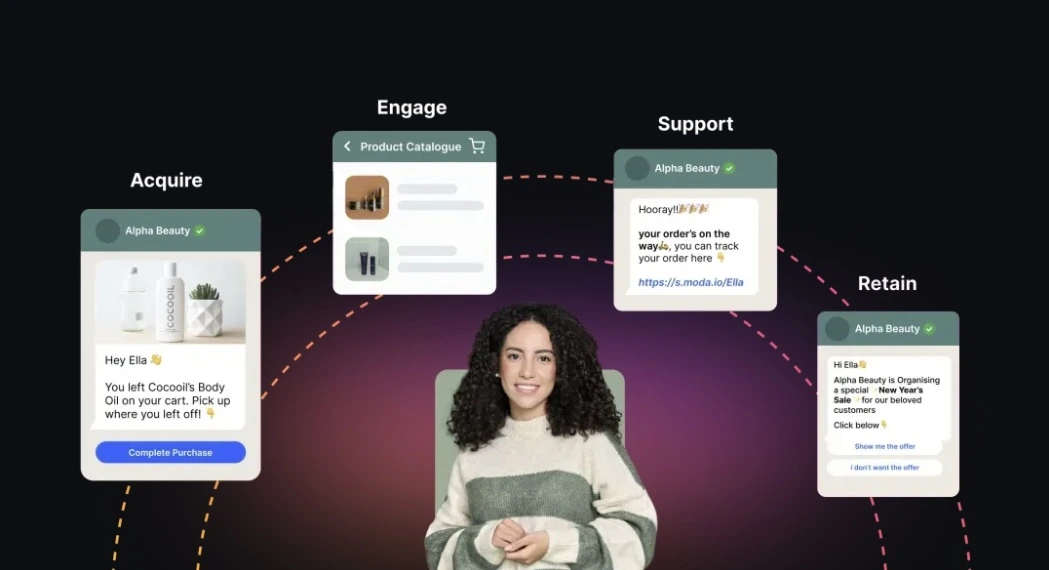
With Lifesight WhatsApp marketing software, you get access to valuable insights into customer preferences, behavior, and engagement patterns. This allows you to hyper-personalize your interactions and marketing campaigns, enhance customer experience, and convert visitors into loyal customers.
Learn more about using CDPs for Ecommerce here.
5) Use Interactive Content
DTC brands can increase customer engagement by utilizing WhatsApp’s two-way communication channel. Instead of bombarding customers with only promotional messages, sending out interactive content like quizzes, surveys, or contests keep them invested and interested.
WhatsApp marketing idea: American brand Hellmann used this concept in their WhatsCook WhatsApp marketing campaign. Participants registered on the brand’s website with their phone numbers to connect with professional chefs. They could share images of the available ingredients through WhatsApp, and the chefs would provide personalized recipe suggestions using those ingredients and Hellmann mayonnaise.
The result? This fun campaign led 5 million people to connect with the brand directly, helped create 500 new recipes using Hellmann mayonnaise, and established a strong engagement between the brand and its target audience.
Read more on such customer engagement campaigns here.
6) Leverage Broadcast Lists
50% of American WhatsApp users access the platform daily, so you can expect high visibility while using WhatsApp for marketing. Unlike regular group chats, broadcast lists on WhatsApp allow you to send messages to many people simultaneously without them being in the same conversation. It’s an effective way to reach a large audience with important announcements or offers, all while keeping their inboxes clutter-free.
With broadcast lists, you don’t have to select particular names every time you want to send a message—all of your contacts who are part of the list will get your message at once. It maximizes your reach, saves time, and also protects private customer data like contact numbers and names from being exposed.
7) Cross-selling Products
When the customer shows interest in a particular product, you can leverage the opportunity to cross-sell related products through WhatsApp. Use existing customer data to display images, videos, and website links of products that they might be interested in.
You can also list down your products along with their descriptions on the WhatsApp catalog. It allows customers to quickly access the available products without leaving the platform, making the browsing and shopping experience as frictionless as possible.
WhatsApp marketing example: Here’s how Alpha Coffee promotes cross-selling.
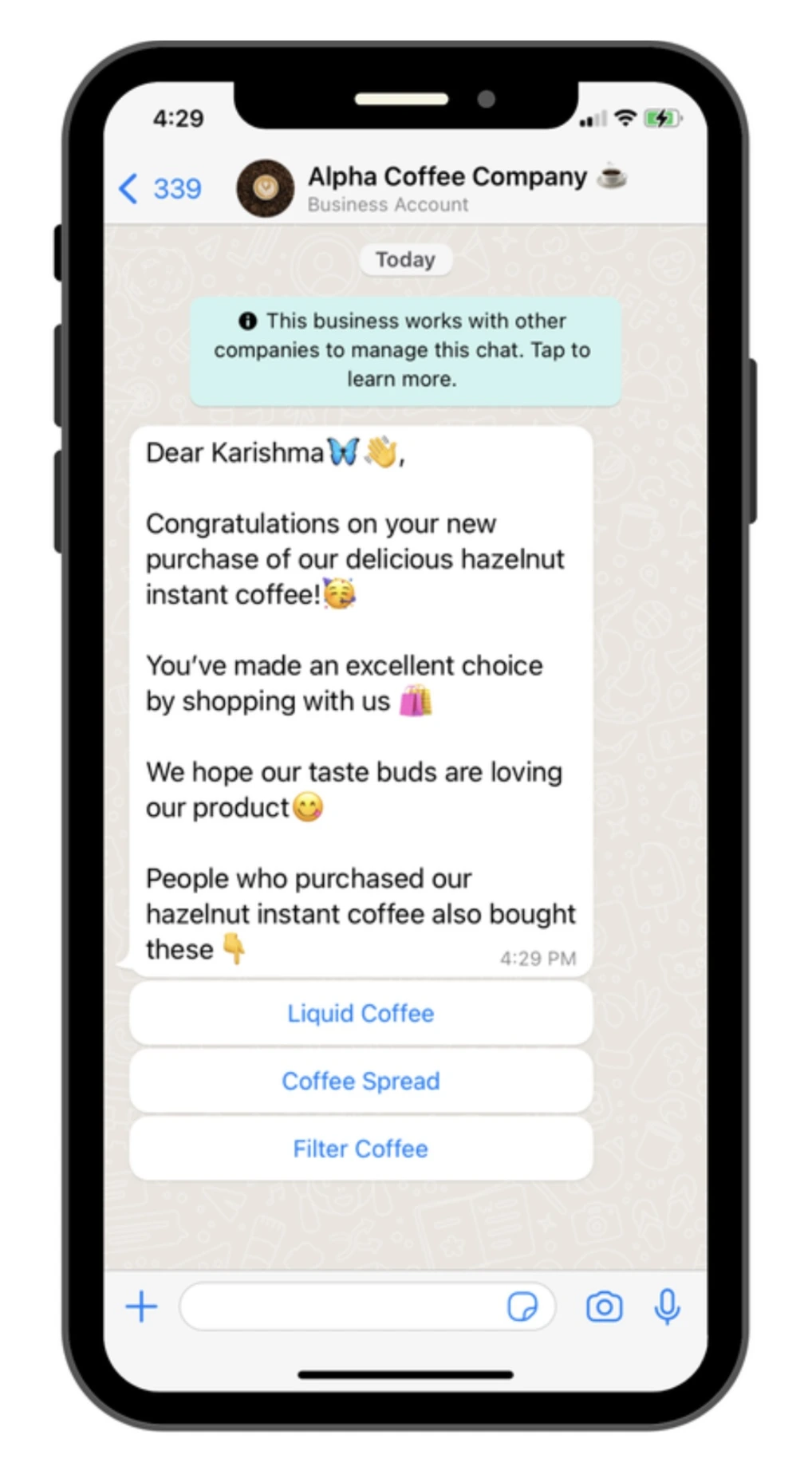
8) Share real-time shipping updates
After receiving an order, use WhatsApp to keep the customer updated with real-time shipping information. From order confirmation to dispatch notifications, tracking details, and estimated delivery time, your customer can track their packages conveniently from their smartphones.
Be it a small local business or a global DTC giant, this feature is useful for brands of all sizes. Take this opportunity to send a personalized welcome message, and win their trust with a transparent order tracking process.
Here’s an example of sharing shipping updates using WhatsApp marketing.
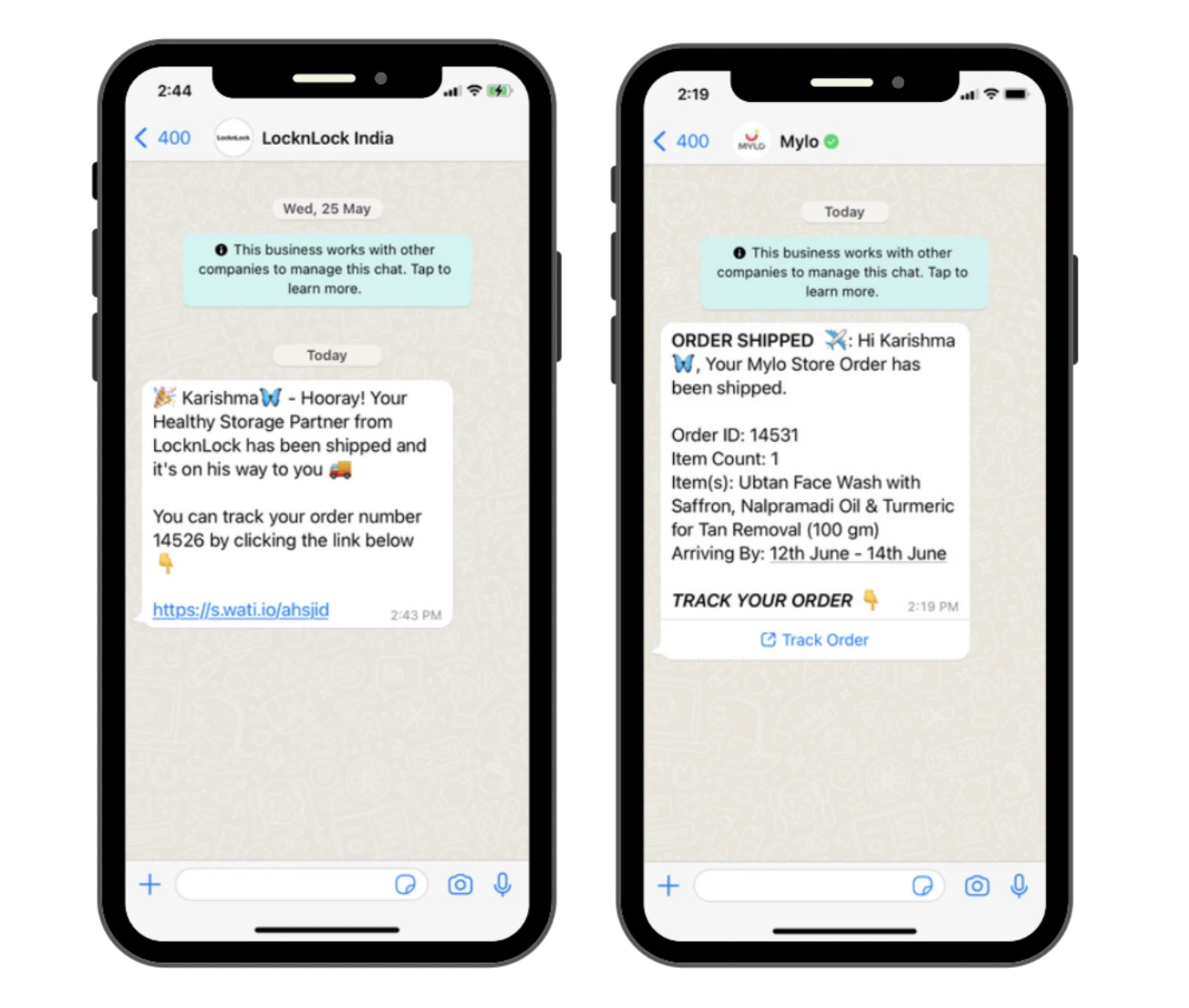
Read more: Leveraging WhatsApp for Conversations and Conversions
9) WhatsApp for Customer Service
In the era of instant messaging, WhatsApp can serve as an effective customer service tool for your DTC brand. Here are some ways you can utilize the platform to enhance customer satisfaction:
- Provide prompt and useful response to queries
- Use your product catalog, images, videos, and GIFs to inform customers in detail about your products
- Send personalized offers based on user history
- Recommend similar products
- Ask for feedback and implement them.
Let’s see how Mylo, an online store for baby, mom, and pregnancy essential products uses WhatsApp marketing post purchase to collect customer feedback.
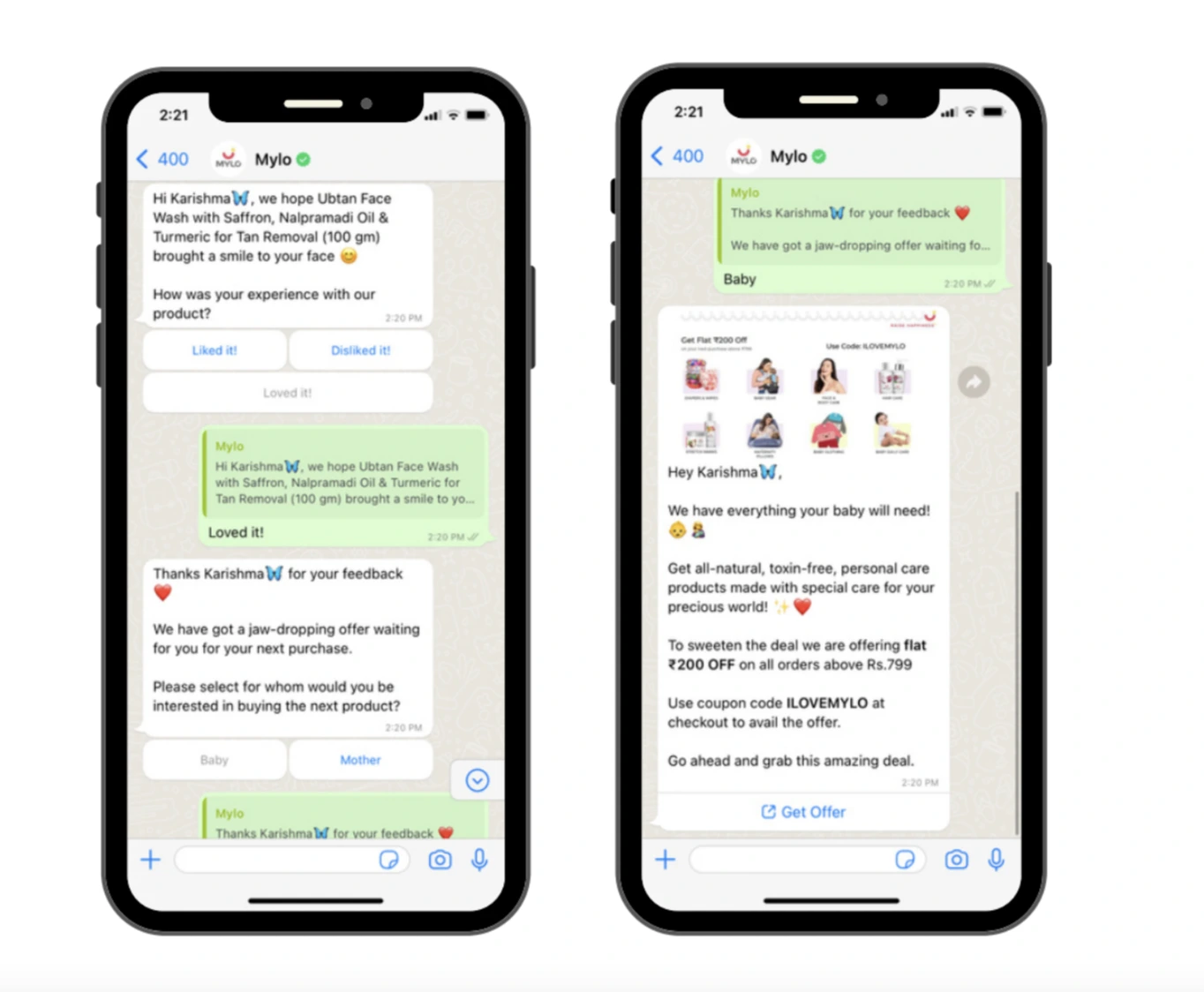
10) Re-target abandoned carts with discount coupons
Send targeted messages on WhatsApp to remind customers about their abandoned carts and offer exclusive discounts or incentives to encourage them to return and complete the checkout. This is a personalized approach to rekindle a lost sales opportunity and increase conversion rates.
What’s remarkable about this WhatsApp marketing campaign is that Alpha Coffee Company used a QR code on its product packaging to drive offline to online conversions.
Final Thoughts
Your WhatsApp marketing initiatives will be deemed successful when they hit the right KPIs. As a DTC/Ecommerce business owner, regularly track the delivery rates, open rates, click-through rates, and conversion rates, and use these data to identify your best-performing customer segment that has generated the highest ROI.
Getting started with a WhatsApp marketing software like Lifesight helps derive insights from these metrics to improve your future marketing strategy. With data-driven and personalized WhatsApp marketing campaigns, you can acquire new customers, drive meaningful engagement, offer excellent post-purchase experience, and build repeat purchase habit loops with upsell and cross-sell automations.
Book a demo with Lifesight and establish your DTC brand as a standout entity in your industry.
You may also like
Essential resources for your success
